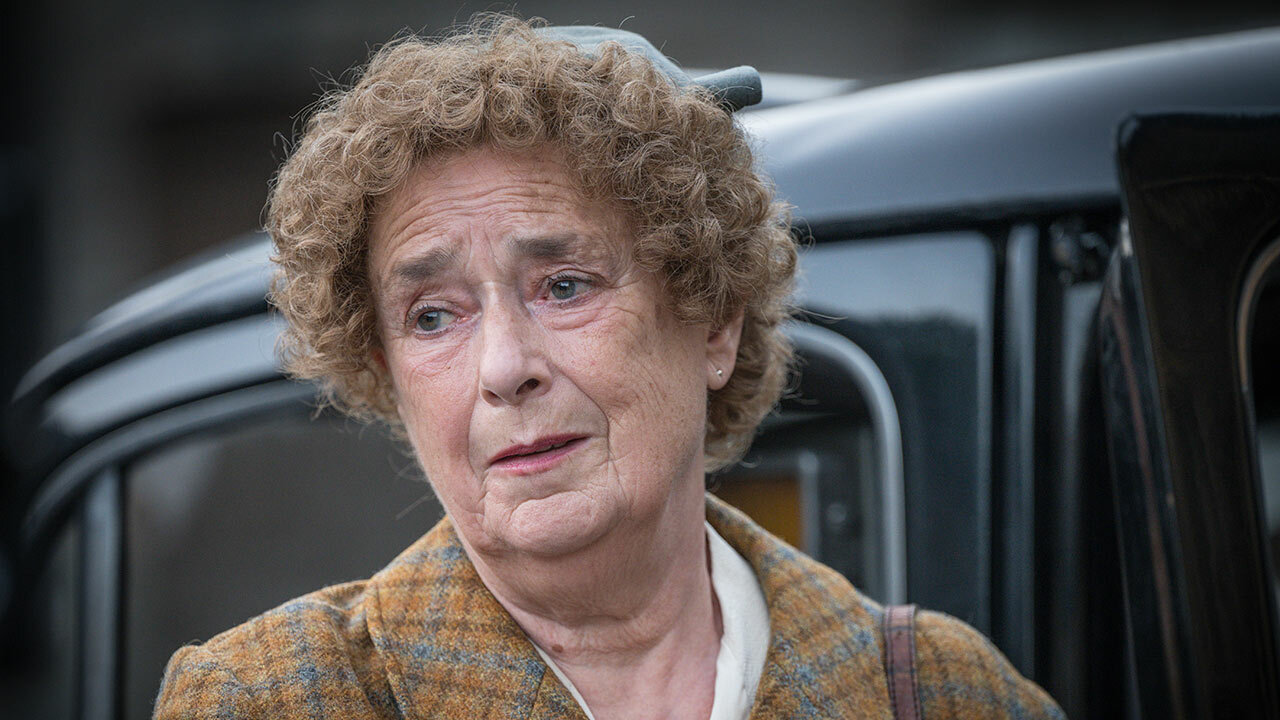Oh no, is it true that we will be without two of our favorite characters, Midwives Phyllis Crane (Linda Bassett) and Trixie Franklin (Helen George), for a spell? What will we do without them? Phyllis is off on a well-earned extended vacation after coming into an unexpected financial windfall, while Trixie is off to Italy to care for a dying aunt. Thankfully, there is no shortage of other lovable characters for whom to tune in. And just as we were all cheering as Trixie seems to have finally made a love connection in Matthew Aylward (Olly Rix) too. Oh well, as long as he will be in Poplar “keeping her life warm” … side note, you may have noticed that pregnancy glow in the actress’s face, and the way the camera angles were shot from the chest up, or with items strategically placed in front of her. She gave birth to her second child in 2021 and was pregnant during some of the filming. Long-time viewers will remember that her “real-life” husband is actor Jack Ashton, who played fan favorite Reverend Tom Hereward on the show a few seasons ago.
The storyline that touched me most profoundly from this episode was that of Lucille Robinson (Leonie Elliott) experiencing a pregnancy loss. Having had complicated pregnancies that resulted in premature births, I could readily identify with Lucille discovering that she was bleeding in the middle of caring for a woman in labor and having to put on a brave face and struggle through it until Phyllis could come and relieve her. For me it was not bleeding, but a premature rupture of the membranes (water bag) at only 24 weeks of pregnancy (just past the midway point) in the middle of a birth in the dead of night. Some call it “curse of the nurse;” it’s not uncommon for nurses, or women in other demanding healthcare professions, to have problematic pregnancies. The shift work, long hours, and constant high stress levels are not necessarily conducive to healthy pregnancies.
I do not know if it feels the same for other midwives but speaking for myself, caring for fellow midwives, nurses, colleagues, and friends is a double-edged sword. It is so lovely to be part of the experience of someone with whom you are close. Yet when things do not go well, it is that much more painful. Maintaining objectivity, when you are so close to the woman and her family, can be extremely challenging. I was so touched by Phyllis’s honesty when Lucille uttered the words “I think I’m miscarrying” while in the bathroom, to which Phyllis tearfully responded, “I think you’re right lass.” All Phyllis could do in that moment was to offer support, truth, and her presence, which was exactly what Lucille needed from her.
The phrase “the art of doing nothing well” has been often associated with the midwifery model of care. These words came to mind as I watched Phyllis crouched outside of that bathroom wherein Lucille was miscarrying. Phyllis was not doing anything “clinical” in the sense that she wasn’t using her “hands on” midwifery skills in that moment, yet she was doing everything just being present with Lucille.
Much of what we do, as midwives, involves just that – standing in the moment with our patients, walking with them through the highs and lows of their life experiences. I often tell people that the profession of midwifery means being present for the most glorious moments of our patient’s lives, of which there is nothing comparable – it is such an honor to be present during those times. Yet when the circumstances are sad, they are the saddest, and walking through those moments with our patients is as important, perhaps even more important, than walking with them through the best times. Midwifery care is a relationship-based model; our patients become our friends, they are our colleagues, people with whom we work, and go to church, and socialize. We are invited to the birthday parties of the babies whom we have helped usher in; we relish the Christmas card pictures that come year after year, delighting in watching babies grow to teenagers, and families expand. As much as our patients may express what they receive from midwifery care, it is a two-way street. We, as midwives, are emotionally and spiritually fed by the work that we do, even in the saddest of moments and circumstances.
